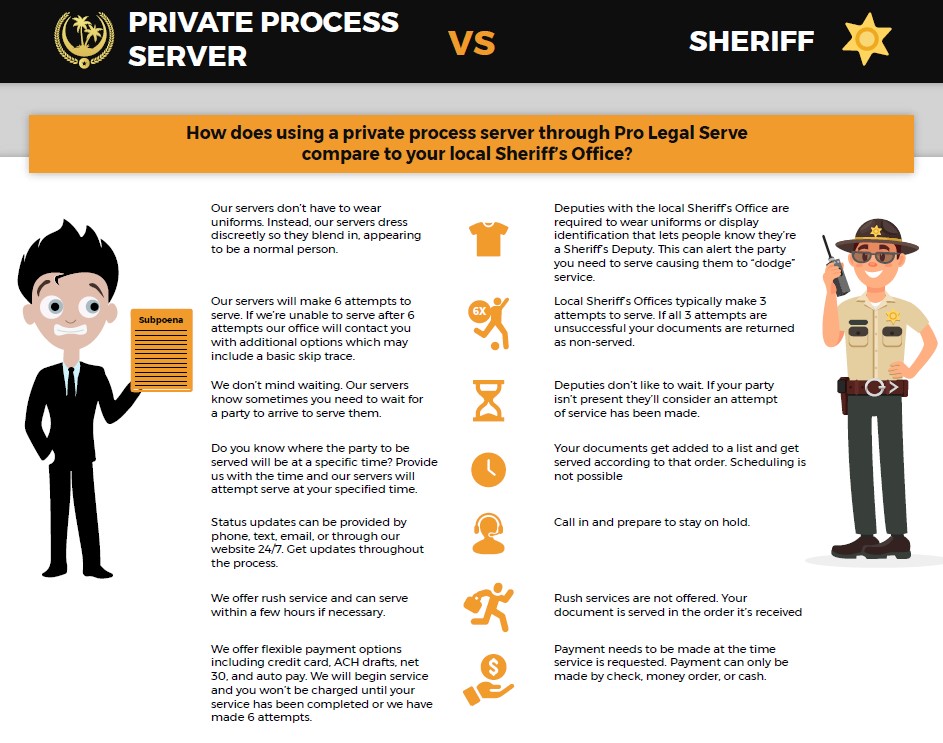Process Serving: A Comprehensive Overview to Legal Document Distribution
Process Serving: A Comprehensive Overview to Legal Document Distribution
Blog Article
Comprehending the Relevance of Refine Serving in Lawful Procedures
Refine offering is an essential facet of legal treatments that guarantees all events are notified of their rights and obligations. By facilitating the official delivery of important lawful files, it maintains the principles of due procedure and adds to the integrity of the judicial system. Nevertheless, the subtleties of effective process offering expand beyond simple distribution; they incorporate legal demands and possible consequences of improper service. Understanding these ins and outs can dramatically impact the outcomes of legal conflicts, triggering a more detailed exam of the techniques that underpin this crucial function.
Meaning of Process Offering
Refine serving is an important element of the legal system, defined as the official distribution of lawful files to individuals involved in a litigation. This procedure makes sure that all celebrations are effectively notified of legal actions being taken versus them or to which they are a party. Generally, these files consist of summons, problems, subpoenas, and other court-related documents that call for the recipient's interest and response.
The significance of procedure serving lies in its duty in maintaining the principles of due procedure. It ensures that people have notice of lawful procedures, thereby giving them a chance to respond or safeguard themselves. Appropriate service of process is not merely a step-by-step rule; it is a fundamental facet of ensuring fairness and openness in the judicial system.
Process serving can be performed by different individuals, including specialist process-server, law enforcement officers, and even attorneys, depending on jurisdictional laws. Each technique of solution has its own requirements and practices, which are critical to stop hold-ups or dismissals within the legal structure. Comprehending the interpretation and feature of process serving is necessary for all stakeholders involved in legal procedures.

Legal Requirements for Refine Offering
Lawful needs for procedure offering are vital to ensure that the delivery of lawful records abides by established protocols and is recognized by the court. Each jurisdiction has specific laws governing just how and when records have to be offered, which may include summonses, subpoenas, and grievances.
Commonly, process-server must be impartial 3rd parties who are not involved in the case. They have to additionally abide by state policies concerning solution techniques, which can include personal solution, substitute solution, or solution by mail. Personal solution involves delivering papers directly to the recipient, while replacement service permits distribution to one more liable individual at the recipient's residence or business.
Additionally, process-server are generally needed to file an evidence of service, a lawful document that verifies the shipment of documents, with the court. This paper includes information such as the day, time, and technique of solution, in addition to the name of the individual served.

Duty in the Justice System
An essential component of the justice system, process offering makes certain that individuals associated with lawful process are appropriately informed of actions taken against them (Process Serving). This formal notification is important for promoting the concepts of due process, which mandates that events have the chance to reply to insurance claims made against them. Without efficient procedure serving, the legal system would certainly be rendered inadequate, as individuals can engage in actions without awareness of pending lawful issues
Process-server serve an essential duty in guarding the stability of the legal process. They serve as neutral events, providing legal documents such as summons, problems, and subpoenas, thus promoting transparency and accountability within the judicial structure. By making certain that all parties are educated, procedure serving helps to stop any possible unjust advantage, permitting equitable participation in lawful procedures.
Furthermore, the professionalism and reliability of process-server adds to the general public's rely on the justice system. Their adherence to lawful requirements and honest techniques enhances the legitimacy of the judicial process. Inevitably, effective procedure offering is indispensable in promoting the policy of legislation and ensuring that justice comes to all people included in lawful disputes.
Effects of Improper Service
The repercussions of improper solution can considerably threaten the integrity of lawful proceedings. Incorrect service can result in the accused not being conscious of the lawful action against them, visit here which may stop them from responding suitably or presenting their protection.
Furthermore, improper service can make court orders and judgments void, compeling the complainant pop over to this site to reactivate the process, which can be both taxing and monetarily troublesome. It can also unlock to charms and challenges, as the defendant may argue that they were not appropriately notified of the proceedings, making complex the lawful landscape further.
Best Practices for Effective Solution

2nd, timing plays a vital function. Offering files without delay can avoid hold-ups in legal procedures and make certain that all parties are informed in a prompt manner. Furthermore, working with an expert process-server can enhance efficiency, as they are educated to browse potential difficulties and make certain compliance with local legislations.
Third, keeping accurate records of the solution procedure is crucial. Documenting the date, time, and way of solution can provide important proof if disagreements emerge regarding whether service was appropriately implemented.
Verdict
Finally, procedure offering is an essential component of legal procedures, making certain that all events are duly notified and managed the possibility to react. Sticking to lawful demands and finest practices not only upholds the principles of due procedure yet likewise strengthens the stability of the justice system. The consequences of improper solution can bring about considerable delays and problems, highlighting the necessity for reliable procedure serving in advertising justness and availability in legal disputes.
The subtleties of reliable process serving expand past that site mere delivery; they incorporate legal requirements and possible repercussions of improper solution.Process offering is a critical element of the legal system, specified as the formal delivery of lawful files to individuals included in a court case. Without reliable process serving, the lawful system would be provided inadequate, as individuals might involve in actions without understanding of pending lawful matters.
Process servers offer an essential role in safeguarding the stability of the legal procedure - Process Serving. The consequences of inappropriate solution can lead to considerable hold-ups and complications, highlighting the necessity for effective procedure serving in promoting fairness and accessibility in lawful disputes
Report this page